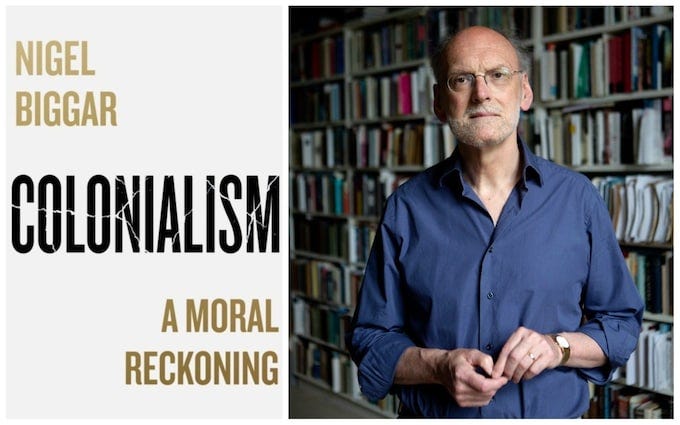Colonialism: A Moral Reckoning
Nigel Biggar at the Lewes Speakers Festival 2024, A Short Scroll
‘There is, therefore, a more historically accurate, fairer, more positive story to be told about the British Empire than the anti-colonialists want us to hear. And the importance of that story is not just past but present, not just historical but political. What is at stake is not merely the pedantic truth about yesterday, but the self perception and self confidence of the British today, and the way they conduct themselves in the world of tomorrow. What is also at stake, therefore, is the very integrity of the United Kingdom and the security of the West. That is why I have written this book.’1
Nigel Biggar’s latest book, Colonialism: A Moral Reckoning, published in 2023, was not released without obstacles. After reading its manuscript in January 2021, Robin Baird-Smith of Bloomsbury said, ‘'I consider this to be a book of major importance.’' During the following March, however, Biggar received an email ‘'from the very top of Bloomsbury’' advising him that publication of his work was delayed indefinitely because ‘‘public feeling’’ was ‘'not currently favourable’’. Bloomsbury cancelled their contract with the author. Thankfully, William Collins was able to save the work from the intolerant claws of cancellation and publish the book. It is an immensely valuable contribution.2
On May 12th, Biggar was the last speaker on the third and final day of the Lewes Speakers Festival in Lewes, Sussex. The event was at the All Saints Centre which is a church first mentioned in 1148. As I made my way into the venue, the old stone facade of the building and the long, healthy spring grass that flanks its entrance presented a tranquil setting in bright sunshine. The quietness of its immediate surroundings enhanced the sense of peace. There is something wholesome and civilised about hearing authors discuss their works before a Q&A in a church. The setting had an intimacy and a calm that diverged refreshingly from a typical auditorium.
Should Biggar return to this event, one would hope the organisers assign him a more favourable speaking slot. Although the attendees were keen, the crowd at ten to seven on a Sunday night was not as sizeable as merited by the significance and impact of the work under discussion.
Biggar told the audience he “wrote the book for political reasons’’. In the summer of 2021, the media forgot that Britain is not America and that slavery is historically universal. In the knowledge that a deluge of lies are told about the British Empire by the cultural left in support of their destructive aims, Biggar felt compelled to write a corrective account. He finds the empire has a longer list of good than bad things to be said about it. He notes the abolition of slavery. Bigger stated that the empire provided regional peace at certain times. Biggar bolsters this claim in his book with detailed accounts of Africans and Asians who lived under British rule. The development of a global economy that offered unprecedented opportunities, colonial governance that did not universally favour British businesses over local ones, sympathy towards native cultures, medicine, and the creation of liberal states are some of the factors he cites in support of the empire.
During the imperial epoch, criticism of the imperial authorities was permitted within Britain. There were a variety of views on race. While acknowledging what he described as the ‘‘biological racism’’ of the nineteenth century, the author pointed out that this never expelled the earlier Christian view that all people are equal under God. In the late eighteenth century, before the age of mass democracy, anti-slavery had popular support. The author called for an adult discussion about what racism is.
Despite a forecast of 15–20,000 sales, Biggar's book on the British Empire has sold around 60,000 copies. The recently released paperback version of Colonialism: A Moral Reckoning features an additional seventy pages that deal with North America and Ireland. The new edition contains answers from Biggar to what he described as his ‘‘ten most damning critics’’, and he concedes to them ‘‘four minor points’’. Anyone seeking a balanced, sober, and learned appraisal of the moral issues that pertain to the British Empire should read the work. The moral methodology he employs may be welcomed by those whose knowledge of this subject derives largely from conventional historical accounts.
Nigel Biggar is Emeritus Regius Professor of Moral Theology at the University of Oxford.
There are many videos of Biggar discussing his work on YouTube. The video below is courtesy of the Danube Institute.
References
Nigel Biggar, Colonialism: A Moral Reckoning, 2023
https://www.speakersfestivals.com/lewes-speakers-festival
https://lewes-tc.gov.uk/venue/all-saints-centre/
Nigel Biggar, Colonialism: A Moral Reckoning, 2023, 7
Ibid, xiii-xiv





